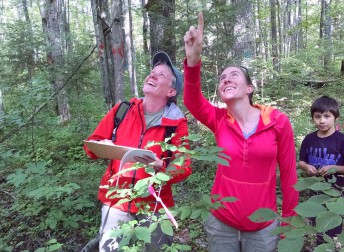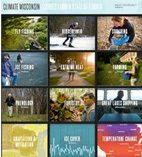ABOUT
The “Gikinoo’wizhiwe Onji Waaban” (Guiding for Tomorrow) or “G-WOW” is a unique educational methodology for increasing awareness of how climate change is affecting the environment, people, cultures, and economies; and promoting action to address it. This website applies the G-WOW framework to investigate how climate change is affecting four seasonal indigenous lifeways as an indicator of how climate change is affecting all of us.
- Integrating traditional ecological knowledge (TEK) of the Lake Superior Ojibwe people and place-based evidence of climate change we are observing in our communities, with "academic" climate research
- Investigating how climate change is affecting cultural practices and treaty rights of the Lake Superior Ojibwe Indians to demonstrate how climate change is affecting people of all cultures.
- Bringing Indigenous perspectives, tribal knowledge, and involvement to addressing issues of climate change.
- Providing learners with knowledge about what they can do in their community to mitigate or adapt to a changing climate.
Key G-WOW message points- Climate change is real.
- Humans contribute to climate change.
- Weather and climate are different.
- Climate affects culture
- We can make a difference
 G-WOW Climate Field Course
G-WOW Climate Field Course
Project Partners include the:
University of Wisconsin-Extension , Great Lakes Indian Fish and Wildlife Commission, US Forest Service, National Park Service, and Lake Superior Ojibwe tribal partners.
Additional Partners Include the:Fond du Lac Tribal and Community College and Chicago Botanical Garden.
This project was funded in 2014-15 by the Wisconsin Coastal Management Program and the NationalOceanic and Atmospheric Administration, Office of Ocean and Coastal Resources Management
under the Coastal Zone Act, Grant #NA11NOS4190097 and continues to be updated.
With additional support from The Great Lakes Restoration Initiative National Parks Foundation, NASA through a partnership with the Fond du Lac Tribal and Community College, and EPA through partnership with the Chicago Botanical Garden.
Special thanks to the following organizations and individuals:

- Climate Wisconsin videos
- Climate Wisconsin, a project of the Wisconsin Media Lab, for climate videos, Finn Ryan-producer.

- Project Budburst phenology resources, Project Budburst, National Science Foundation
G-WOW CURRICULUM DEVELOPMENT AND DESIGN
CURRICULUM DESIGN TEAM
- University of Wisconsin-Extension:
- Cathy Techtmann-Environmental Outreach Specialist, University of Wisconsin-Extension
- Great Lakes Indian Fish and Wildlife Commission:
- Sue Erickson-Public Information Director and Jim St. Arnold- Program Specialist (Nigaanigiizhig) - Program Director/Traditional Ecological Knowledge (TEK) Coordinator
- Apostle Island National Lakeshore-National Park Service:
- Neil Howk-Assistant Chief of Interpretation and Education and Damon Panek-Park Ranger/Ojibwe Cultural Specialist
- US Forest Service:
- Jason Maloney-Director; Northern Great Lakes Visitor Center
TECHNICAL ASSISTANCE
- Wild Rice Harvesting Unit
- Peter David- Manoomin Biologist and Lisa David-Wildlife Biologist; Great Lakes Indian Fish and Wildlife Commission
- Fishing Unit
- Mark Luehring- Inland Fisheries Biologist and Bill Mattes- Great Lakes Section Leader Great Lakes Indian Fish and Wildlife Commission
- Respecting Our Culture Unit
- Jonathan Gilbert-Wildlife Section Leader and Tanya Aldred, GLIFWC Wildlife Biologist; Great Lakes Indian Fish and Wildlife Commission
- Maple Sugaring and Birch Bark Harvesting Unit
- Alexandra Wrobel-Forest Ecologist; Great Lakes Indian Fish and Wildlife Commission
- “What Can We Do” Section, service learning template, and curriculum editing
- Megan Brown- Environmental Outreach Intern; UW-Extension, Northern Great Lakes Visitor Center
- G-WOW Logo Development
- Jennifer Burnett-Outreach Specialist; Great Lakes Indian Fish and Wildlife Commission
- Project Support
- Sarah Traaholt- Office Manager; UW-Extension, Northern Great Lakes Visitor Center